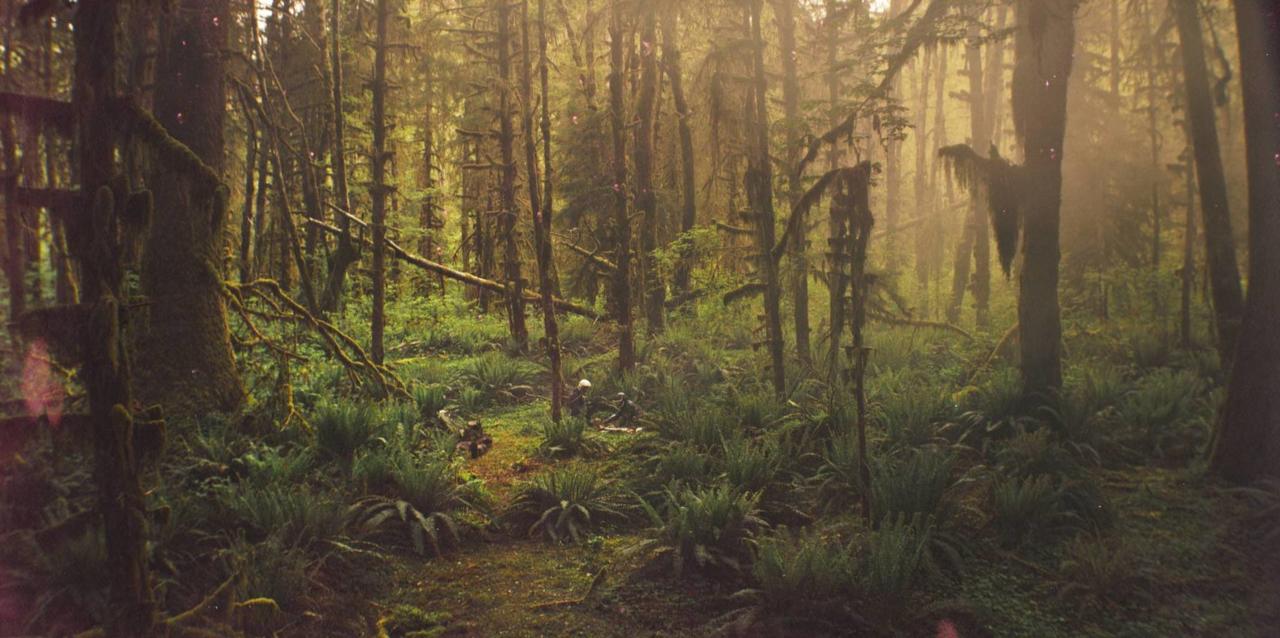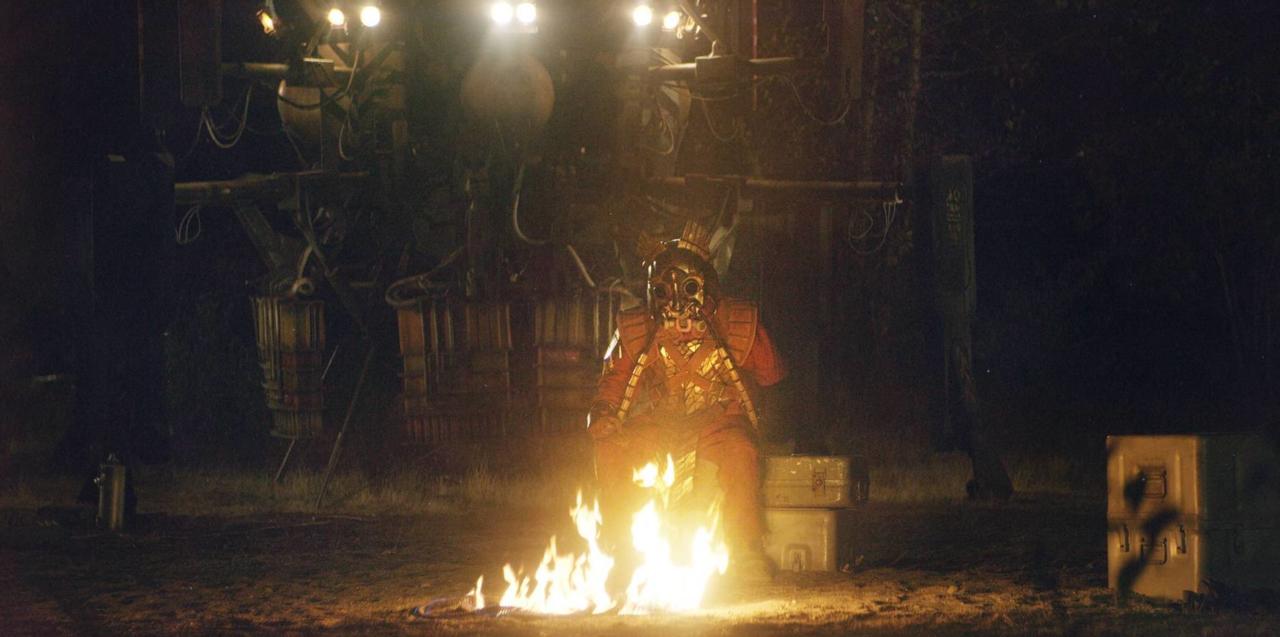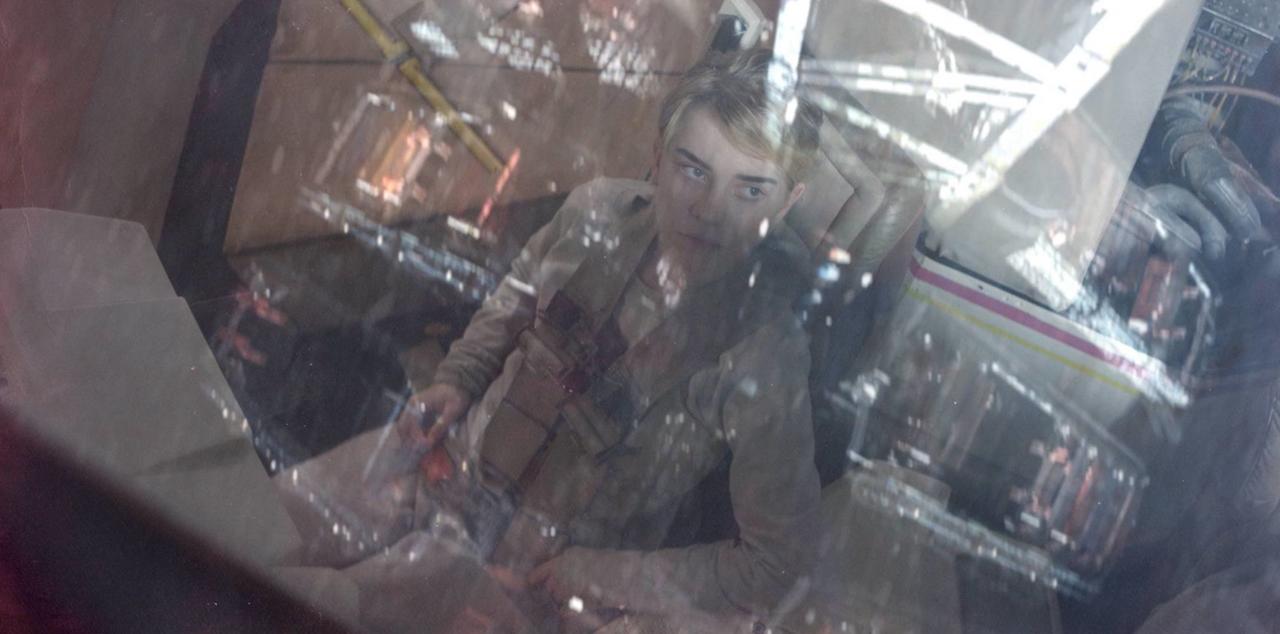Prospect is different from most of the sweeping, universe-scale sci-fi epics that come out these days. No one is trying to destroy any planets or galaxies, there's no millennia-spanning lore about ancient races seeding the future with mysterious artifacts, and Earth isn't locked in a desperate war with any distant colonies (that we know of). Instead, Prospect is the story of a man, his daughter, and a bandit trying to simply stay alive on an unforgiving alien frontier. And it has some insanely awesome practical special effects.
Directed by Christopher Caldwell and Zeek Earl, and based on their 2014 short film of the same name, Prospect follows Cee (Sophie Thatcher), her father Damon (Jay Duplass), and a bandit named Ezra (Game of Thrones' Pedro Pascal). It's the plot of a Western transplanted onto a faraway planet: Damon and Cee are essentially gold prospectors who score big before Ezra strikes and turns their lives upside-down. Just replace gold with larvae-like alien bug crystals, cowboy hats and chaps with clunking space suits, and the dusty frontier with a lush jungle pervaded by thick, poisonous clouds of "dust" that necessitate keeping those suits on nearly 24/7. That's Prospect.
"Unlike a lot of very either futuristic or contemporary-feeling science fiction, our movie isn't about impressive or magical-feeling technology," Earl told GameSpot during a recent interview. "We had a mantra up in our pre-production shop that said, 'Technology cannot save you.' And that's very much at the core of what Prospect is. It's a story that's driven by the characters, not by any gadgets."
"We grew up on those classic sci-fi films, like Alien, Blade Runner, the original Star Wars trilogy. I mean, we were the type of kids that would be poring over the Star Wars visual encyclopedia and obsessing over all the guns and ships and all the side characters--the people that you only see for a frame," Caldwell said. "I think part of what we wanted to do with Prospect was to channel some of that excitement that we experienced, and I think it also informed a lot of the texture and the aesthetic. We very intentionally wanted the world to be rendered not so heavily in green screen backdrops and computer generated stuff, but in physical things that you feel, like it's a world that you can reach out and touch."
The pinnacle of that philosophy in Prospect turns out to be the characters' space suits, creaking hodgepodges of cobbled-together-looking tubes, wires, antennae, plating, visors, and more. They're straight from the Star Wars original trilogy school of sci-fi design: Space is dusty, dirty, and half broken down, not sleek, shiny, or "futuristic" in a mid-20th-century, Jetsons kind of way. They appear heavy, restrictive, and real, and the actors wear them for about 95% of the movie's run time.
"The suit took 15 minutes to take off, and I didn't want to delay production or anything, so I stopped drinking water, and then it became really hot and that became a problem," Thatcher told GameSpot. "I'm being honest," she laughed. "Maybe I shouldn't be so honest!"

"We had to be careful with action scenes, because you get winded faster when you're wearing [the suits]," Earl explained. "You can't breathe as readily. I mean, they're constantly fogging up. We had anti-fog wipes going constantly between takes."
"They're just also heavy," he continued. "We designed them to be as light as possible, but I think after two weeks, Jay Duplass was like, 'I'm going to immediately go get a massage. I can't do this anymore.'"
Their dedication to practical sets, props, and effects paid off when it came to immersion for the actors. "It helped create a realistic atmosphere," Thatcher said. "Sometimes I felt like I didn't even need to act, because everything was there right in front of me, and I was reacting to my surroundings--especially with the helmet. The helmet helped me the most. Once I put on the helmet, it helped me to fully plunge into the Prospect universe and really get into the mindset."

It was more than just a stylistic choice. The directors have seen a trend in sci-fi movies: "They're constantly coming up with excuses for actors to take their helmets and suits off," Earl lamented. "We were very like, 'No, no, no. They're trapped on a toxic moon. They're trapped in these suits. They're trapped in these helmets. We want the actors wearing them the whole time.' And man, I'm happy with the result."
He did acknowledge the actors' suffering, though: "I'm glad we did it, but I feel legitimately bad for how much Sophie and Pedro Pascal and Jay Duplass had to endure because of this vision, because man, you wear these helmets and obviously they're props, but the airflow is pretty restricted, and they fog up. We had whole teams of people that would have to rush in once we yelled cut and whisk the visors off and rub them down. It was a major ordeal. For the record, Sophie, I'm very thankful for your suffering."
Focus in on any aspect of this movie, and you'll notice the same dedication. The poisonous dust floating around the jungle isn't a CG particle effect, but images of real dust, shot in Caldwell's basement, "painstakingly" layered into nearly every shot. The movie's unique weapons, which look like railguns and gatling guns cobbled together from plastic, mining tools, and spaceship parts, were designed by a real firearms expert and crafted from 3D printed segments, hand-carved parts, and a handful of "off the shelf" components. Caldwell and Earl started their own production design shop--mostly composed of their friends crafting away for seven months in a warehouse--because they simply couldn't afford to outsource all the work.
Caldwell said using practical effects is important to keep audiences grounded. "When you're creating an alien universe, an otherworldly universe, if there's any suspicion that something's not real, it takes you out of it," he said. "And I think for Prospect it was really important that the narrative feel grounded--that we wanted to do otherworldly science fiction that feels very, very real."
Their obsession over worldbuilding extended beyond the practical effects, too. Every time they wanted to introduce a new element, like a band of mercenaries, a mining company, or a song Cee listens to on her headphones, they had a writing exercise to flesh out far more background story than was needed.
"There's just so much detail in the real world that you take for granted," Caldwell explained. "If you set something in a contemporary setting, everywhere you point the camera, you've got all of that detail in there. When you're starting from scratch, you have to really compensate for it, and what we were trying to do was to overcompensate as much as possible--to take as much of the flavor of the world and expository elements out of the mouths of the characters, and put it into what is visually apparent in the backdrop of every scene."

That degree of attention to detail helps elevate an indie movie with a relatively small budget to an engrossing story that takes place in a believable sci-fi setting. But it's also that very indie-ness that may make Caldwell and Earl's way of doing things possible.
"Somewhere half way through production the financier sent down their head of production to check in on things, see how we were doing, and he showed up to set and just started laughing," Caldwell recalled. "We had triple the amount of detail in our props and in our backgrounds, and the whole set was 360 [degrees], and for him it was just like, no other movie does this. You just figure out what's going to be on camera, and make it to that. Well, we were actually trying to make complete, fully immersive environments that we could point the camera every direction, and give it a real sense of place."
That may not be a pragmatic or efficient way to make a movie, but the result is out of this world.
Prospect is the first feature film from Gunpowder & Sky’s sci-fi label DUST. It hits theaters Friday, November 2.
